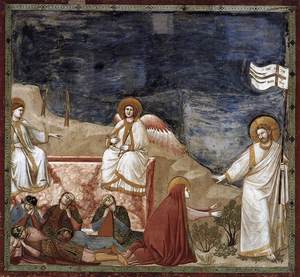[T]he sacraments constitute the events of a time which is the tension between the Resurrection and the Parousia …. Thus during the delay of the Parousia, the Eucharist prevents humanity, in this foretaste of celestial food …. And the Eucharist is the sacrament of unity which gathers about Christ of glory, present in the community, all nations in order to offer them through His hands to the Father.
Tag: Jean Daniélou
Christ’s resurrection means that now our humanity is elevated to the divine
Addressing all Christians through the mouth of Saint Paul, the Spirit cries out: “If you have risen with Christ, seek the things that are above, where Christ is seated at the right hand of God” (Colossians 3:1).
For all its brevity, that sentence contains the most amazing assertion. In effect, it signifies not only that Christ has risen and that we ourselves shall one day rise with him, but that we have already risen with Christ through our baptism. The whole mystery of what it is to be a Christian subsists in that statement. Apparently, our human condition remains unchanged; yet Christ’s resurrection has already accomplished its transforming work in the hidden world of our souls. Christians are now only waiting for the outward manifestation of what has already been achieved in Christ. Saint Paul, in fact, goes on to say: “Your life is hidden with Christ in God. When Christ who is your life is revealed, then you too will be revealed with him in glory” (Colossians 3:3-4).
The resurrection, therefore, means that here and now our humanity is elevated to the inaccessible realm of the divine. The resurrection is the Good News par excellence, the glorious destiny, far above its own nature, to which the Father’s love has called the human race in his only Son through the gift of the Spirit.
All this only possible through the action of God. In Christ, God comes down to us, takes our carnal nature, and raises it above itself in order to carry it into the intimate presence of the Father, where Christ is seated at the right hand of God.
Thus the resurrection of Christ constitutes the first-fruits of our own resurrection. With Christ, part of our humanity is already taken up into the abyss of the Godhead. According to the metaphor employed by the writer to the Hebrews, Christ is like an anchor, which instead of being let down in the depths of the sea, is cast up into the heights of heaven (cf. Hebrews 6:19). He is the guarantee of our hope, because that hope has already been fulfilled in him.
Jean Cardinal Danielou, S.J. (1905-1974)
